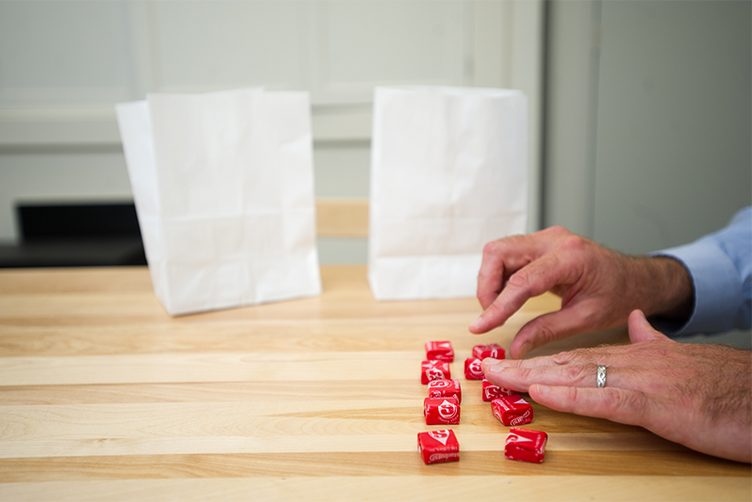Learning to Share
Differences in how US and Indian children learn about generosity

When the trick-or-treating is over, when the pillowcases and plastic jack-o’-lanterns are spilled out and the candy is heaped on the living room floor, the real work of Halloween begins: the annual ritual of sorting and hoarding the candy stash. While children are busy separating the Bit-O-Honeys from the Jolly Ranchers, parents have a ritual of their own: imploring their children to share their loot. Giving away the hard-earned candy is a test of moral stamina for any sweet-toothed kid, and the results (tears! tantrums! negotiations!) may leave parents wondering if they are instilling the right values in their children. Now, research by Boston University psychologist Peter Blake published in the Journal of Experimental Child Psychology is revealing why, when it comes to sharing, American children may choose not to follow their parents’ generous lead.
Blake, assistant professor in BU’s psychological and brain sciences department and director of the University’s Social Development & Learning Lab, has spent almost a decade studying how children learn to share. Previous studies by Blake and others have shown that when researchers give three-year-olds a bag of candies or stickers and ask them to share some with a peer, they typically give away only one or two treats. As children get older, they act more generously: eight-year-olds will often give away half of the goodies. Blake wants to learn how this sense of mini-philanthropy develops and how family, friends, and teachers influence children to be more—or less—generous.
Since the 1970s, researchers have known that adults influence how much children are willing to give away. When children watch adults act generously, they are more likely to share liberally themselves, even when their parents aren’t looking over their shoulders. But, researchers found, charity seems to have a limit. No matter what the grown-ups do, children will not give away more than half of their stash.
Is this giving “ceiling” really hardwired, though, or is it a product of culture? The early experiments were only performed in the United States and Canada. Maybe, Blake thought, the results would be different elsewhere. To find out, Blake and his colleagues—John Corbit at Simon Fraser University, Tara Callaghan at St. Francis Xavier University, and Felix Warneken at Harvard University—recruited about 300 children and their parents in two very different parts of the world: urban areas in and around Boston and a rural southern region of India called Andhra Pradesh, where families live in small villages of about 2,000 people. The children were between three and eight years old.
Their experiment went like this: While the child watched, the researchers first gave the parent ten candies and two empty bags. Then, they invited the parent to divide the candy between the bags, one to keep and the other to give away to someone without any candy of her own. This part of the experiment was actually a bit of playacting—secretly, the researchers had already told the parent exactly how many candies to give away, with half of the adults randomly assigned to be “stingy” and the other half to be generous. Each child watched as the candies were divvied up. Then, the child got her own pile of candy and the same invitation to share it as she liked, out of view of the parent.

When the parent was stingy, children in both the United States and India gave away fewer candies than they did in a “control” situation, when they couldn’t see how many candies their parents gave away. “The selfish model was powerful,” says Blake.
But when parents were generous, giving away nine out of ten candies in their bag, the American and Indian children diverged. “In the US, the kids were not influenced at all,” says Blake. “But in India, the older kids were more likely to do exactly what the parent did.” In fact, the majority of children age five and up in India gave away five or more of their candies; only five percent of US children did the same. The children in India breezed right through the 50-50 “ceiling” that, to Western children, represented the pinnacle of fairness.
Next, Blake and his colleagues want to find out why the children in India followed the generous model more faithfully. They think the answer may have to do with values that, on the face of it, have little to do with generosity or selfishness. “In these rural areas of India, respect for elders and obedience to them, and conforming to the norms that are demonstrated to you—that is a strong value,” says Blake. In the United States, parents do not put the same weight on compliance: “What trumps it is that parents want their kids to be independent and autonomous.”
To Blake, the difference also underscores the fact that results from experiments performed in the United States aren’t necessarily universal. “People are resistant to the idea that maybe our results are the product of our own culture,” says Blake. “[Cross-cultural experiments] break us out of assumptions that everything we see in the US is just an innate way of thinking.”
So, should parents in the United States conclude that they are raising selfish children? No, says Blake. “Parents are teaching them other values that conflict with things like generosity: the values of being independent, and thinking for yourself,” says Blake. “As parents, you’re not failing to teach your kids to share—you’re succeeding in a different way.”

Comments & Discussion
Boston University moderates comments to facilitate an informed, substantive, civil conversation. Abusive, profane, self-promotional, misleading, incoherent or off-topic comments will be rejected. Moderators are staffed during regular business hours (EST) and can only accept comments written in English. Statistics or facts must include a citation or a link to the citation.